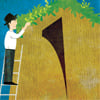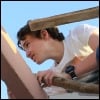From the sliding glass doors of my kitchen, I can observe them. They are all energetically at work—my husband and my youngest two children, ten year-old Yisroel Pinchas and his younger, four year-old sister, Sara Leah.
Though it is an autumn day, early in October, it feels more like a balmy afternoon in the height of the summer. In another couple of days, the holiday of Sukkot will be upon us, and the three of them are working diligently to put the finishing touches on our erected sukkah.
My husband stands in the center of the sukkah, perched high on a ladder, and his two helpers are handing him the evergreen branches, lying in our backyard in a nearby pile. As his helpers hand him the bunches, my husband places them atop the sukkah roof, completing our hut as the Torah instructs, as a temporary dwelling, shaded with foliage.
But really this scene could be happening in any other setting, at any other time—with my husband working on a project and his little helpers industriously extending the effort to assist him.
With a smile, I watch my children scurrying back and forth to bring my waiting husband more and more branches, as the shrinking pile on the ground slowly dwindles. Yisroel's arms are overflowing as he strenuously carries the largest and heaviest branches. Sara Leah, too, is trying to mimic her brother, as she competes with him in hauling the largest bundles that her little arms can carry.
But as I watch a little closer, I notice Sara Leah alternating between really large and really small bundles. While some of her bundles are almost bigger than she, I notice on other trips, she is also deliberately selecting the tiniest little branches, which she holds with as much significance and determination. I watch her with utter fascination carrying a solitary tiny branch with equal resolve and devotion as her largest piles.
It takes me a few moments to realize what is going through her little mind.
To Sara Leah, the big branches are indeed important, but the little ones are equally so. They, too, have a rightful place on top of the sukkah and they, too, have their own worthy role to play. To her, these little branches are not just an afterthought, nor are they second choice, but indeed just as credible and just as essential.
Sometimes, the older we get, the more we tend to look out for the "larger" things in life. Those things that will make a bigger impact, provide more "shade" or greater prominence for us. Or those things that will help us to complete our tasks faster.
Sara Leah, though, reminds me constantly of the value of the little things in life—the things that may not be as large or glitzy, nor as noticeable or distinguished. These are those small gestures that are so easy to overlook for the larger and seemingly more important ones, the small acts and moments that usually don't earn us any award or recognition.
Like the kind word said to our loved ones amidst the hustle and bustle of the many important chores in our day to day schedule.
Like the smile extended in greeting a neighbor or co-worker amidst the vital projects that we are working on.
Or like the thoughtful moments taken out to say a blessing of gratitude to our Creator in middle of all the many essential and valuable tasks in our day.
As Sara Leah later explained to me, the larger bundles were like the "Mommy and Daddy" branches, and the little ones, were, like her, the "little Sara Leahs."
And what could be nearly as precious as something as little and endearing as she?






